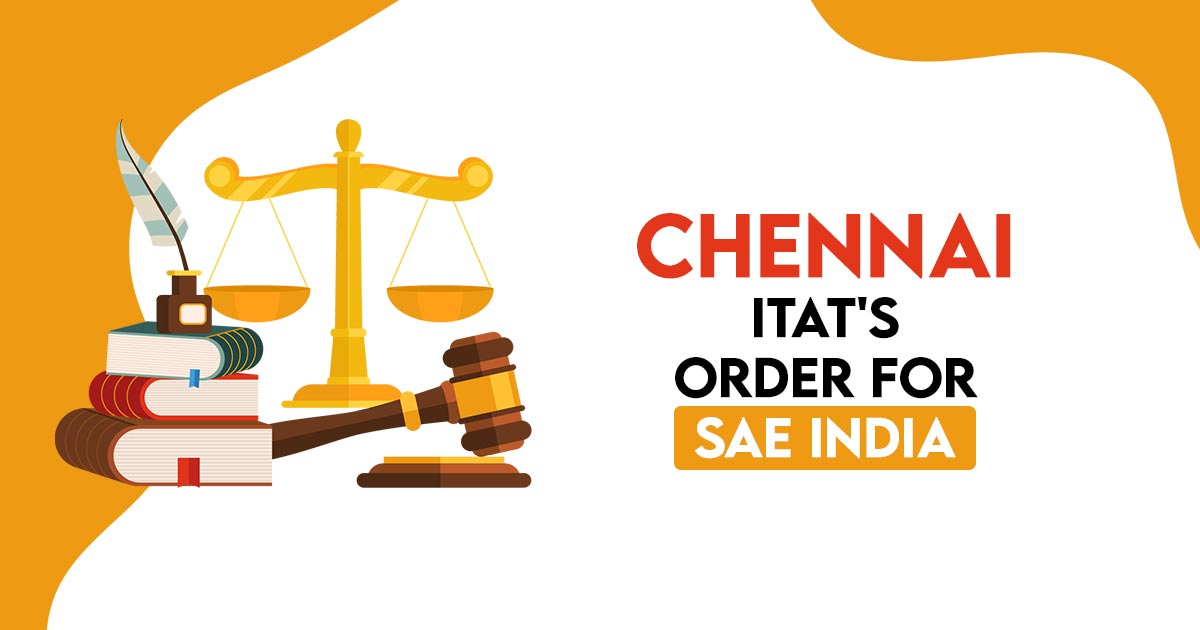
Under Section 11 of the Income Tax Act, 1961 the income tax appellate tribunal (ITAT) Chennai bench ruled that exemptions must not be allotted when the activities of the trust are like trade, commerce, or business.
The Taxpayer, SAE India, was registered Under Section 12AA of the Income Tax Act, 1961 from AY 2004-05 onwards. The taxpayer has filed its income return dated 30.09.2013 admitting a ‘nil’ income. The case was designated for scrutiny.
Hence AO witnessed that the objects of the taxpayer counted beneath the last limb of the definition of ‘charitable purpose’ as defined under Section 2(15) of the Income Tax Act.
Before the Assessment Order (AO), the taxpayer contended that the Society was established to provide education in the realm of Mobility Engineering.
The taxpayer organized various educational initiatives such as technical meetings, workshops, seminars, and other programs designed for the society’s members, all falling within the scope of education as per Section 2(15) of the Income Tax Act. Despite these arguments, the AO dismissed the assessee’s claims and denied the exemption under Section 11 of the Act.
Displeased with this decision, the assessee appealed with the Commissioner of Income Tax (Appeals) [CIT(A)], which was subsequently granted in favour of the assessee. Subsequently, the revenue filed a second appeal before the tribunal.
During the proceedings, S. Sridhar, representing the assessee, reiterated that the Trust’s objectives align with the provision of education in the field of Mobility Engineering.
Furthermore, it was argued that the assessee actively conducted various activities, including technical meetings, workshops, seminars, and other educational programs, with the explicit goal of promoting the profession of mobility engineering. These activities, according to Sridhar, squarely fit within the definition of ‘education’ as outlined in Section 2(15) of the Income Tax Act.
P. Sajit Kumar, the Counsel for the revenue, argued that the purposes and activities of the assessee’s Trust fall within the final category of ‘charitable purpose,’ specifically encompassing any other object of General Public Utility (GPU). According to this perspective, if the income generated from such activities surpasses the specified limit, the assessee would forfeit the tax exemption benefits conferred by Section 11 of the Income Tax Act.
In light of this, entities such as trade promotion bodies, councils, associations, or organizations are unequivocally regarded as GPU charities and are subject to the stipulations outlined in Section 2(15) of the Income Tax Act. Consequently, if the undertakings of these GPU charities involve trade, commerce, or business for a fee or cess, the corresponding Trusts or Societies would be ineligible for exemption under Section 11 of the Income Tax Act.
The tribunal observed that the assessee is engaged in organizing technical meetings, workshops, seminars, educational programs, and specialized conferences for the advancement of Mobility Engineering, among other activities.
Read Also: Chennai ITAT: Compensation Payments Are Not Considered Interest U/S 194A for TDS Deduction
It was further highlighted that the assessee falls within the final category of the ‘charitable purpose’ definition outlined in Section 2(15) of the Act, covering any other object of GPU.
The Trust’s objectives and activities are deemed to be in the realm of trade, commerce, or business, thus falling under the provision specified in Section 2(15) of the Income Tax Act. Consequently, the eligibility of the assessee for exemption must be scrutinized in consideration of both gross receipts and receipts derived from trade, commerce, or business activities.
If the gross receipts derived from the General Public Utility (GPU) activity, specifically from trade, commerce, or business, exceed 20% of the total gross receipts, the assessee is not eligible for exemption under Section 11 of the Income Tax Act. In the present assessment year, the gross income of the assessee from organizing conferences surpasses 20% of the overall gross receipts, leading to the conclusion that the assessee is not entitled to exemption.
Following a thorough examination of the facts and records, the two-member bench comprising Manjunatha.G (Accountant Member) and Manomohan Das (Judicial Member) determined that exemption under Section 11 of the Income Tax Act should not be granted when the activities of the trust are commercial, involving trade, commerce, or business.
| Case Title | M/s.SAE India Vs Income Tax Officer |
| Citation | ITA Nos.3144 & 3158/Chny/2018 |
| Date | 20.10.2023 |
| Assessee by | Shri S.Sridhar, Adv. |
| Department by | Shri P. Sajit Kumar, JCIT |
| Chennai ITAT | Read Order |









